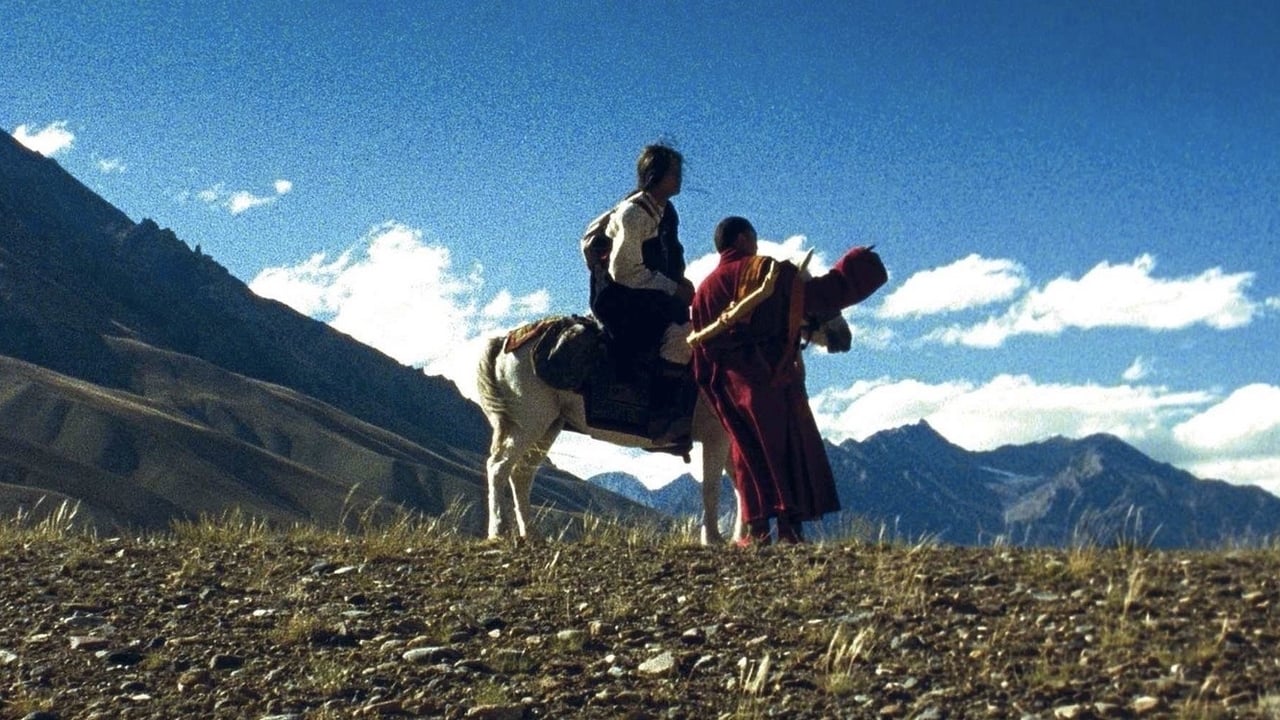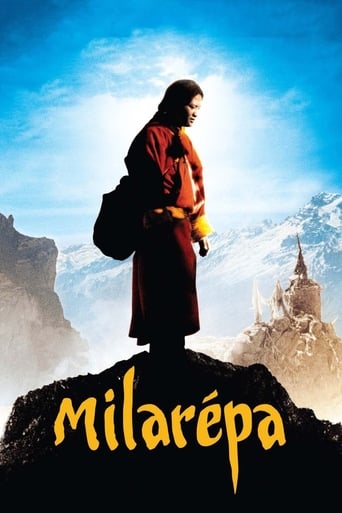TrueJoshNight
Truly Dreadful Film
GamerTab
That was an excellent one.
ChicDragon
It's a mild crowd pleaser for people who are exhausted by blockbusters.
Wyatt
There's no way I can possibly love it entirely but I just think its ridiculously bad, but enjoyable at the same time.
Reno Rangan
A biopic of a greatest Tibetan yogi, Milarepa, who was earlier known as Thopaga, that set in the first century of the second millennium. This story was classified into two parts. This one was the first which covers the story from his childhood to becoming an adult who then later turn into a great magician in the history of Tibet for the sake of his mother.He was like the Japanese Zen Buddhist teacher, Dogen Zenji, to the Tibetans who comes in the later century of the history. In the Milarepa's story he learns tricks to avenge people who were not fair to his family after his richest father's death. Then later he changes his course from vengeance to serve the people after realising that it goes on and on and never ends.''One man's pleasure is another man's pain''The movie was very inspiring from its negative side of the thoughts. I mean it gives a good lesson about our path towards the mistakes. We won't choose it, but forced to take it. Some of the scenes really got deep into me, especially one of them where Milarepa uses his magic power against his enemies and an old woman in his nearby wipes tears falling from her eyes and leaves the place without saying anything. It was so quiet, but was filled with meaningful. That is where the movie really got me.So sad the movie about a great personality was incomplete. I mean in the end of the first installment they said the follow-up is in due to release very soon, but they did not make it. I believe it might be a financial issue. I am very desperate to know the rest of his life story and now I had to prefer the book about him instead waiting for a sequel. Hope you guys won't miss this movie or books about this wonderful man.8.5/10
Muldwych
"If you are many, make war. If you are few, make sorcery!" 'Milarepa' is a film adaptation of one of Tibet's most famous ancient legends, based loosely upon the life and teachings of a Buddhist yogi and poet (in his youth known as Thöpaga) who lived in the 11th Century. Born to wealthy parents, Thöpaga's father dies young, allowing his greedy siblings to spirit away the family inheritance. Near-destitute, Thöpaga and his mother struggle to eke out a living until the mother eventually snaps and compels her son to learn sorcery so as to inflict revenge on their malefactors. However, the boy quickly discovers that revenge comes with its own price. This film chronicles the early years of this now-revered figure, and is very much within the fantasy genre, playing as it does with the myths and the melodrama surrounding the character, though his principal teachings sit at the core of the plot, which have been a source of inspiration to generations. New to the tale of Milarepa, I found myself generally enjoying this big-screen retelling, despite certain issues I had with its execution.It seemed fairly apparent that this is a film preaching to the choir, as it were, with many sequences flying along as if obligatory shorthand for an audience already familiar with the story, but a little too rushed for anyone else. To those unfamiliar, the early sections of the film in particular seem like edited highlights that required more time and build-up to achieve maximum impact. For example, the introduction where Thöpaga's father dies and the siblings show their true colours is a very few minutes in length and family ruin consequently achieved at a whirlwind pace. Storywise, the key elements are intact, but the sometimes choppy pacing and rapid jumps forward in time prevent sufficient character development, an essential process in lending believability to what is after all pure fantasy. It's clear that director Neten Chokling is keen to get to the sorcery element, thereby relying on several sequences of over-the-top melodrama within the family to sell the desire for revenge. Again, if you're familiar with the story and know what's coming, this is doubtless not such a problem.Indeed, once Thöpaga does set off on the road on his voyage of discovery, the fantasy element really takes over and the adventure begins in earnest. All throughout 'Milarepa', the audience is treated to some truly breathtaking Himalayan scenery – surely one of the most dramatic landscapes on earth. Here at the Roof of the World, it truly does seem as though magic could determine the fates of man, and the backdrop does much to sell the story. Yogic strongholds sit precariously atop mountains and seem to dominate the magnificent valleys below. Here, Thöpaga must travel to seek the otherworldly skills that will let him inflict revenge, which his masters seem quite keen to impart. It almost seems irresponsible, yet Buddhism is after all about passing on knowledge rather than judging how the beholder will use it.After all, while mastery of the self is the Buddhist philosophy, 'Milarepa' is very much about karmic retribution, which its central character painfully learns must flow in both directions. The 'sorcery' of the film is realised through a surprising amount of cgi that takes the film very much into cartoon territory, but this is after all a retelling of the legend rather than a biopic, and if you're going to delve into the mythology, you may as well go all the way. Perhaps because the earlier scenes had been so 'comic book' in structure, I found myself very much in the right frame of mind when the visual effects appeared and if anything, this is where my enjoyment properly set in.It does mean that those hoping for a deeply spiritual Buddhist epic on the folly of conflict will be disappointed – the message is there intact, but in very much the same way that it was in 'Monkey Magic'. Whether or not this makes Jamyang Lodro's portrayal of the young Thöpaga a little too close to Hayden Christiansen's Anakin Skywalker is up to the viewer to decide, as is the question of whether or not Chokling's approach to his subject matter is out of a desire to make 'Milarepa' into Tibet's answer to Tolkien. Either way, Lodro plays the troubled youth convincingly and is helped by several other good performances, most notably Orgen Tobgyal, as his willing yogic master - apparently also the film's art director.Thöpaga's real-life alter ego would famously recount years later that he had been very foolish in his youth and faced a long path to wisdom ('How senseless to disregard one's life by fighting foes who are but frail flowers'). His voyage to maturity and enlightenment is purportedly the focus of the sequel, which at this stage, is long overdue. This therefore means that 'Milarepa' does not have a strong ending - so much of the story is yet to be told, and hopefully Chokling will succeed in bringing it to light. In that event, 'Milarepa' will doubtless be better evaluated as simply the opening chapter of a much larger tale – one of reckless youth, in which mistakes are made that lead to wisdom in the wise. This does not absolve it of its cartoon fantasy leanings, but as my introduction into the world of this highly celebrated Tibetan spiritual leader, it was an entertaining enough ride.
Slowbrother
Milarepa the movie is the first of a series of two. It depicts the legend of Milarepa. It's filmed in Tibet - among the all-present towering mountain ranges, which makes the sky and heavens seem so close, and shot in the Tibetan tongue. Both things - combined with the delicate portrait of the people and the culture, and the quiet yet captivating development in this beautiful movie, makes it a movie of grace, a bit of wonder, and of visual beauty. It's a silence in this movie, which touched my heart.Concerning the content, this depicts the first part of Milarepa's journey into spirituality, as it is interpreted in the popular legends of Tibet. I won't reveal too much, but this movie depicts his family, the harshness of life in Tibet, the upbringing of Milarepa, and the pains they had to undergo. And the way all this shot Mila (he first became -repa, when he became a lama; -repa being the suffix designating this) into the violent world of adulthood, realizing the sufferings of this world for himself.The second part to come in this series, depicts Milarepa's life as a lama, I believe.The movie may be a bit slow in its out-folding, and a bit "lacking" in its contents; it has its flaws. But for my part these shortcomings were filled by how the splendor which the themes of the movie, which are very dear to me, was wonderfully spilled out.
Oslo Jargo (Bartok Kinski)
Milarepa (2006) is an interesting Tibetan film chronicling segments from the life of a Tibetan yogi, Thopaga / Milarepa, who lived in the 11th century in western Tibet, who was born into a wealthy family but on the death of his father, was robbed of his inheritance by his father's greedy family. His mother complains about suffering throughout the film but to the viewer, she really doesn't have it that bad, it seems like she only longs for more wealth. Hence the universal themes of vengeance and yearning dictate her motives and disposition. She influences her son Thopaga / Milarepa to study sorcery to inflict revenge on his father's greedy family, leaving his female companion, who is quite beautiful.The first half of the film is quite good and simple in nature, familiar conflicts play a vital theme. The landscape is absolutely stunning and the low key, natural realism of the actors is very momentous.The film loses some of its impetus when it delves into silly Computer-generated imagery during the sorcery scenes. These could have been left out altogether, and insinuations, inferences, and basic camera tricks would have sufficed much better to keep it resembling an elementary human drama. The silly Computer-generated imagery knocks the sorcery scenes down to a "sword and sorcery" Hollywood look-alike.I enjoyed it though and it was capable if you are intrigued by foreign films. In all, it is an above average film that imparts a universal common, human leitmotif, that is of human meaning and human predicaments.


